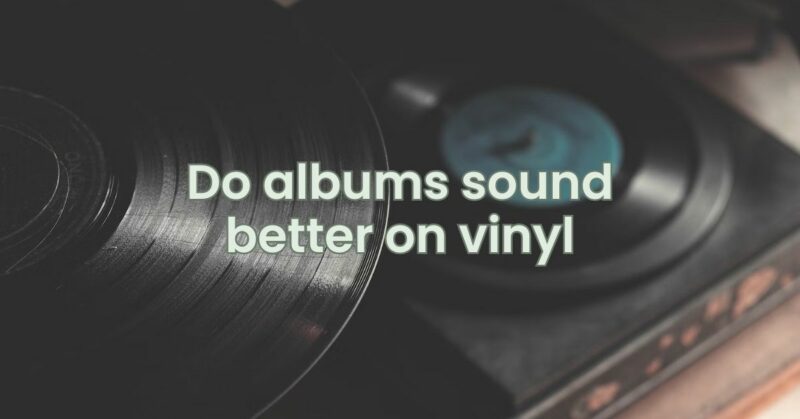The resurgence of vinyl records in recent years has sparked a passionate debate among audiophiles and music enthusiasts: Do albums sound better on vinyl? While vinyl records offer a unique listening experience and possess a charm that digital formats can’t replicate, determining whether they inherently sound better than digital audio requires a closer examination of the factors at play. In this article, we’ll delve into the vinyl vs. digital audio debate and explore the characteristics of both formats.
The Analog Warmth of Vinyl:
Vinyl records are analog recordings, capturing the sound wave as a continuous physical imprint on the record’s grooves. When played, the stylus traces these grooves, translating the physical movement into electrical signals, which are then amplified and played through speakers. This analog process imparts a warm and organic sound to vinyl recordings, often described as more natural and immersive by vinyl enthusiasts.
The High Fidelity of Digital Audio:
Digital audio, on the other hand, uses a different approach. Sound is sampled and converted into a series of numerical values, which are then stored as digital files. When played back, these files are converted back into analog signals to be amplified and heard through speakers. The precision of digital audio allows for high-fidelity reproduction, capturing an accurate representation of the original sound.
Factors Influencing Sound Quality:
Several factors influence the sound quality of vinyl and digital audio:
- Dynamic Range: Vinyl records have a limited dynamic range compared to digital audio, which can affect the reproduction of soft and loud sounds in recordings. Digital audio’s wider dynamic range allows for greater subtlety and detail in the sound.
- Noise and Distortion: Vinyl records can introduce noise and distortion during playback, such as surface noise and clicks caused by dust or scratches. Digital audio, when played through a high-quality system, is typically free from such issues.
- Mastering: The mastering process can significantly impact the sound of a recording. Some albums may be mastered differently for vinyl and digital releases, leading to variations in sound quality between the two formats.
- Source Quality: The quality of the original recording and its source material also plays a crucial role in sound quality. A well-mastered vinyl record sourced from high-quality recordings will likely sound impressive, as will a well-encoded digital audio file sourced from high-resolution recordings.
Subjectivity in Sound Perception:
Sound perception is subjective, and individual preferences vary widely. Some listeners prefer the warmth and character of vinyl records, while others appreciate the clarity and precision of digital audio. The nostalgia associated with vinyl and the tactile experience of handling records also contribute to its appeal for many enthusiasts.
Conclusion:
The question of whether albums sound better on vinyl or digital audio is subjective and depends on individual preferences and listening experiences. Vinyl records offer a unique and nostalgic listening experience, with their warm analog sound and physical presence. On the other hand, digital audio provides high-fidelity reproduction and convenience, allowing listeners to carry vast music libraries in their pockets.
Ultimately, both formats have their strengths and weaknesses, and what matters most is the music itself and how it resonates with the listener. Whether you prefer the analog charm of vinyl or the convenience of digital audio, the joy of music lies in the emotions it evokes and the memories it creates, regardless of the format in which it is played. So, let the music be your guide, and immerse yourself in the pleasure of listening, whether it’s on vinyl or in the digital realm.


